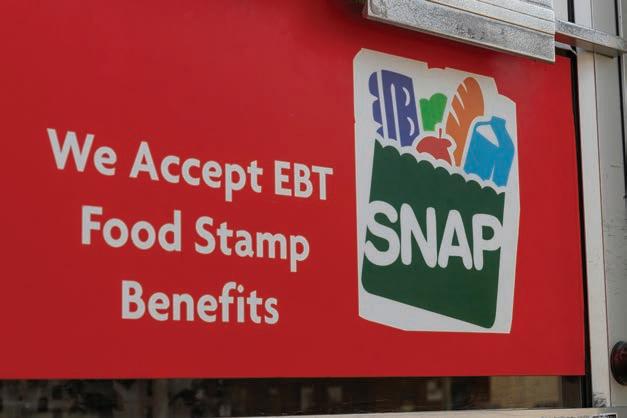
2 minute read
SNAP aid falls to pre-pandemic monthly totals
Dropping $90 per month
BY HALEY LENA HLENA@COLORADOCOMMUNITYMEDIA.COM
ose who receive Supplemental Nutrition Assistance Program, or SNAP, bene ts will see a reduction in monthly totals after February as emergency allotments are slated to end.
Part of a federal nutrition program, SNAP helps low-income households in Colorado purchase food by providing monthly bene ts based on income, resources and the number of individuals in the household.
In March 2020, in an e ort to ease the nancial impact the COVID-19 pandemic had on households, Congress approved temporary bene t amounts known as Emergency Allotments.
At the end of February, SNAP bene ts will not disappear but bene t amounts will go down to pre-pandemic levels.
According to the Colorado Department of Human Services, the last emergency allotment bene t was delivered this month.
According to a report released by the Colorado Department of Human Services, the SNAP program caseload for Douglas County for 2022 was 3,549, with a client count of 6,998. is includes non-public assistance and public assistance.
Many people don’t feel Douglas
County has this need but Executive Director of SECORCares Mark Heistand said it is prevalent in the community.
“ e county’s always like ‘we’re one of the… whatever… fth richest counties in the United States,’ well yes, we may be per capita income, but we have our friends and neighbors that are right next to us and are experiencing all sorts of life issues,” said Heistand. “ ere are people that are deciding between paying the rent or purchasing groceries or paying a medical bill.”
SECORCares is a nonpro t organization that provides food and nancial assistance to Elbert, Arapahoe and Douglas counties. e Colorado Department of Human Services estimates an average reduction of $90 per person each
On an average day, SECORCare will serve 400 to 500 people and on Saturdays they serve up to 3,000 people. Of those served, about 35 to 40% are Douglas County residents according to Heistand.



“So it’s a pretty hefty drop o happening, at the same time we are seeing kind of these record highs in grocery prices,” said Brie Dilley, director of philanthropy at SECORCares. “Along with all of the economic instability that we’re seeing across all of the di erent socioeconomic statuses. It feels a little bit like the straw that’s gonna break the camel’s back.” e increase in grocery prices will a ect the amount of resources these types of organizations receive. About 30 to 40% of the food that SECORCares passes out depends on donations they receive from grocery stores and partners.
Not only will the reduction in bene t amounts impact residents, it will also impact organizations like SECORCares that serve the community.
SECORCares grocery rescue program includes items such as cans of beans, vegetables and rice.
“What happens is our guests then don’t have the ability to pick up the kind of food that they normally get,” said Heistand. “So it’s compounded by the fact that we no longer have a lot of pre-rescue food coming in, in order to give our hosts and their guests the amount of food they need.”
In addition to SECORCares, Douglas County provides various food, medical and nancial assistance programs.
Rochelle Schlortt of Catholic Charities of Central Colorado said there is not just one program that can o set the reduction of SNAP bene ts.
“It will require a re-examination of a family’s entire budget,” said Schlortt. “Looking at where income can be increased, where expenses can be reduced, how families can change meal planning to lower meal costs, tapping into monthly supplemental programs, shopping pantries, couponing and taking advantage of grocery sales.”
Heistand said there has already been a trend developing in the number of people coming in for assistance.
“I don’t think we know for sure what kind of impact we’re going to see,” said Heistand. “And if that trend stays like it is and then we add on top of this, this reduction in the amount of money that folks are going to have for groceries, it could be critical very quick.” e Colorado Department of Human Services provides tips for families to make the transition. Tips include rolling over unused SNAP bene ts to the next month and stock up on non-perishable items.







